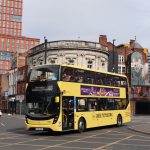Marc Winsland (pictured), Senior Consultant at SYSTRA UK and Ireland, has issued a warning that an acceleration of bus reform under the Labour government risks being overshadowed if the built environment for buses is not addressed.
In making the warning Mr Winsland, who has held positions at McGill’s Buses and National Express, argues that franchising and municipalisation efforts will not yield significant improvements without a robust approach to prioritising bus travel and adapting town planning accordingly.
He makes the comments as an accelerated pace of structural reform is indicated under the new government, while recent reports reveal that buses in Oldham are less punctual under the franchised Bee Network.
“We have to get serious about giving physical road space and priority to bus services if we want them to perform better. If nothing else, more public control and ownership, depending on the model, is perhaps a good thing, because it invites officers and elected officials to pay attention earlier in the process and, if they have a stake in the outcome, encourage a need to address root causes of congestion,” he says.
A cultural shift is necessary to support that, alongside the need for an appetite to stand up to motorists, and adequate enforcement. “There are many examples of a disappointing attempt to keep motorists happy that has diminished the effectiveness of bus priority,” Mr Winsland adds. “That hasn’t yielded the return that it is supposed to and has weakened the business case for bus priority.”
Operators are encouraged to support the reform agenda by continuing to embrace partnership working and other local authority reform initiatives. He cites examples such as Leicester, where an Enhanced Partnership has been “exemplary” in delivering improvements over a short space of time, and Transport for Cornwall, where operators have worked with the regional authority to establish the low fares pilot scheme.
“Embrace it, have a genuine commitment to collaboration with the authorities, and see the value in working together. There are pockets around the country where it is working. Private operators can succeed, and authorities can support them. We don’t have to wrestle control, and through a collaborative approach, both can see the burden on either side ease. Where resources and ideas are pooled, we are seeing success as a result.”
Mr Winsland notes that finance will now be the major barrier to successful reform. “With Labour now in power, it will have a full measure of the economy and know how quickly it can speed up investment. That takes precedence over political will. Provided that money can be found on a sustainable basis, we should see more mayors pushing for it.”
Autonomy will be another critical factor in successful reform, and Mr Winsland is confident the new government will enable that. “The plan is local empowerment. Smaller authorities are not shy about saying what is and isn’t right for them, or that they want private operators to flourish.
“We need a candid recognition that this is not a public versus private debate. This is about having an honest mindfulness of the real reasons for decline rather than trying to force it to suit preconceived notions.”
Without change, Mr Winsland fears worsening congestion and no improvement in passenger experience. That risks a political, not practical, debate between public and private ownership. “If we do get it right, and I believe getting it right will involve public and private partnership, that circle becomes a line of progress that we can continue. If we can make the case without eliciting eye rolls from the public that public transport is a desirable, affordable alternative to using the car, we will be able to achieve modal shift.
“We make the arguments now, but they are hypotheticals. We need ready evidence that it is going to work and going to be of benefit.”



























